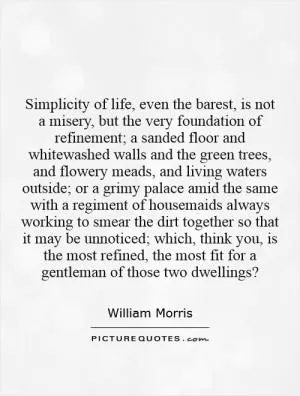... [Nature] ever bearing witness against man that he has deliberately chosen ugliness instead of beauty
![... [Nature] ever bearing witness against man that he has deliberately chosen ugliness instead of beauty Picture Quote #1 ... [Nature] ever bearing witness against man that he has deliberately chosen ugliness instead of beauty Picture Quote #1](https://img.picturequotes.com/2/28/27613/-nature-ever-bearing-witness-against-man-that-he-has-deliberately-chosen-ugliness-instead-of-beauty-quote-1.jpg)
... [Nature] ever bearing witness against man that he has deliberately chosen ugliness instead of beauty
William Morris, a prominent figure in the Arts and Crafts movement of the late 19th century, was a staunch advocate for the preservation of nature and the promotion of beauty in all aspects of life. His belief in the intrinsic connection between humanity and the natural world is evident in his works, where he often depicted the harmony and beauty of nature as a stark contrast to the industrialization and urbanization that was rapidly taking over society.In Morris' view, nature served as a constant reminder of the beauty that exists in the world, and the importance of preserving it for future generations. He believed that by choosing to prioritize industrialization and materialism over the preservation of nature, humanity was deliberately choosing ugliness over beauty. This sentiment is echoed in his famous quote, "Nature ever bearing witness against man that he has deliberately chosen ugliness instead of beauty."
Morris saw the destruction of nature as a direct result of human greed and disregard for the environment. He believed that by exploiting the natural world for profit and progress, humanity was not only destroying the physical beauty of the earth, but also its spiritual and emotional significance. In his eyes, the industrialization of society was not only detrimental to the environment, but also to the human soul.
For Morris, the solution to this problem lay in a return to the principles of the Arts and Crafts movement, which emphasized the importance of handcrafted, natural materials and the celebration of beauty in all aspects of life. He believed that by reconnecting with nature and embracing its beauty, humanity could rediscover its true purpose and live in harmony with the natural world.












 Friendship Quotes
Friendship Quotes Love Quotes
Love Quotes Life Quotes
Life Quotes Funny Quotes
Funny Quotes Motivational Quotes
Motivational Quotes Inspirational Quotes
Inspirational Quotes